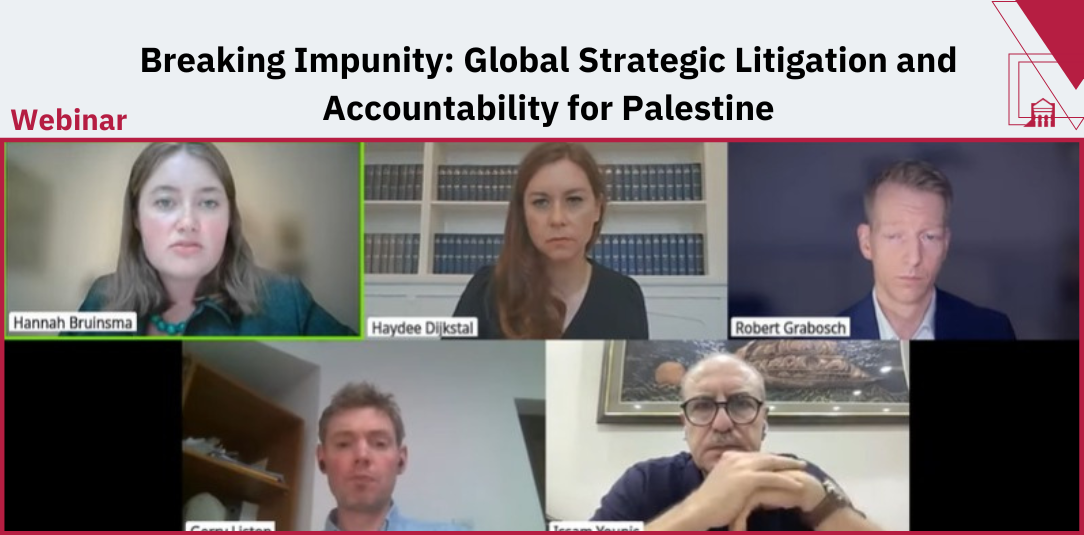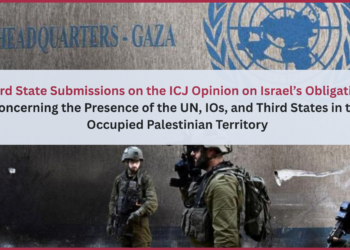Webinar Explores Legal Tools to Break Impunity and Advance Accountability for Israeli Crimes in Palestine
On 22 July 2025, Law for Palestine, in collaboration with Al Mezan Center for Human Rights, ESCR-NET International Network for Economic, Social and Cultural Rights, ETO Consortium, and the International Centre for Justice for Palestinians (ICJP), hosted a webinar titled “Breaking Impunity: Global Strategic Litigation and Accountability for Palestine.” The event, which is the first in a two-part series, brought together prominent legal practitioners, human rights defenders, and civil society representatives to discuss the potential of strategic litigation, universal jurisdiction, and corporate accountability in confronting Israeli impunity for international crimes committed in the occupied Palestinian territory (oPt).
The webinar, the fifth in Season 3 of the Jurists for Palestine Forum, focused on the role of states, civil society, and legal professionals in ending the ongoing genocide in Gaza and broader Israeli violations through domestic and international legal mechanisms. It particularly addressed how corporate actors and complicit third states can be held accountable under international law.
Moderated by Hannah Bruinsma, Access to Justice Coordinator at Law for Palestine, the webinar featured four prominent speakers: Issam Younis, General Director of the Al-Mezan Center for Human Rights; Haydee Dijkstra, Barrister at 33 Bedford Row Chambers and Acting Chief Counsel at ICJP; Robert Grabosh, German lawyer and expert on Business & Human Rights; and Gerry Liston, Senior Lawyer at GLAN, focusing on illicit financial flows and illegal settlements.
The discussion opened with a critique of European states’ continued reluctance to impose sanctions or reassess their relations with Israel, despite mounting evidence from Palestinian and international organisations documenting ongoing atrocities. The moderator emphasized that focusing solely on humanitarian aid -while ignoring the broader context of systemic injustice- allows the occupation to continue unchecked.
Bruinsma also highlighted the vital role of legal strategies in holding states and corporations accountable, citing recent breakthroughs such as the Flemish court’s order to halt military shipments to Israel and the Belgian Federal Police’s arrest of two Israelis. Additionally, she pointed to the significant commitment made by several Global South states at the Hague Group Emergency Conference on Palestine in Colombia. These nations have pledged to use universal jurisdiction as a tool for holding individuals criminally accountable for violations of international law. Bruinsma noted that this growing momentum marks a new phase in the struggle for justice, one that moves beyond rhetoric and towards meaningful, concrete action.
Issam Younis on the role of Palestinian Civil Society in seeking justice and accountability
“The shrinking space for civil society is no accident, it’s designed to prevent Palestinians from seeking justice”
Issam Younis, in his intervention, addressed the critical role of Palestinian civil society in pursuing accountability. He characterized the ongoing genocide in Gaza as a manifestation of the systemic failure of the post-World War II international order. Referencing the establishment of the UN in 1945, Younis questioned the credibility of a system that repeatedly fails to prevent genocide, including the one in Palestine.
Younis also critiqued Israel’s legal system, highlighting how Palestinian civil society has long attempted to engage with Israeli courts over grave violations of international law and international crimes, but to no avail, no Israeli soldier or authority has ever been convicted of war crimes or crimes against humanity. This failure led Palestinian groups to focus on international legal mechanisms like the International Criminal Court, the United Nations, and national courts using universal jurisdiction to hold Israel accountable. However, these efforts come at a significant cost, with Palestinian civil society organisations facing criminalization and repression from the Israeli government.
Younis pointed to ongoing legal actions in European courts, such as cases in Germany, France, and the Netherlands, challenging Israel’s violations and third-state complicity, particularly around arms exports. He made it clear that while strategic litigation is not a comprehensive solution and cannot replace political action, it is an essential tool in demanding justice and building a legal record of Palestinian rights under international law.
Haydee Dijkstal Strategic Litigation and the Global 195 Project
International criminal lawyer Haydee Dijkstal presented the Global 195 Project, led by the International Centre of Justice for Palestinians (ICJP). The initiative builds a global legal coalition aimed at investigating and prosecuting war crimes and crimes against humanity committed in Gaza, leveraging the principle of universal jurisdiction.
Dijkstal explained that universal jurisdiction allows states to prosecute certain grave crimes regardless of where they occurred or who committed them. This principle, she argued, is critical to overcoming the limitations of traditional international legal avenues, such as the International Criminal Court (ICC) or the International Court of Justice (ICJ). These limitations include the ICC’s scope of crimes and the focus on the prosecution of only those most responsible, leaving many perpetrators outside their mandate.
She cited the example of a recent case in Namibia, where ICJP helped file a complaint in April demanding the investigation of Israeli officials for war crimes, including the use of starvation as a weapon, utilizing evidence collected by ICJP and its partners. The complaint was filed based on Namibian domestic law that incorporates provisions of the Geneva Conventions, including damage to civilians and property and using starvation as a war method. The Namibian police acknowledged receipt of the complaint—marking a historic first for such a submission in the country.
Robert Grabosch: Corporate Complicity and the German Legal System
German attorney Robert Grabosch presented a case study on the German media giant Axel Springer and its subsidiary Yad2, a real estate platform advertising properties in illegal Israeli settlements in occupied Palestinian and Syrian territories. The platform also uses maps of “Greater Israel” and nationalist slogans. Grabosch explained that such practices violate Germany’s 2023 Supply Chain Due Diligence Act, which requires companies to prevent involvement in human rights abuses. A formal legal complaint was filed against Axel Springer with the German supervisory authority BAFA, which initially gave no response but later expressed a willingness to examine the case. However, in March, BAFA dismissed the complaint, citing the anonymity of the complainants and the lack of rights for villages or municipalities in land grabbing cases. Grabosch criticized this rejection as a reflection of Germany’s political reluctance to hold Israel or its corporations accountable, despite similar cases where anonymous complaints were considered due to safety concerns. An objection to this dismissal is currently under review by BAFA.
Grabosch emphasized that legal mechanisms, such as the German Supply Chain Due Diligence Act, already exist to hold companies accountable for human rights violations. He also highlighted other legal avenues, including the EU’s import bans and France’s 2017 civil liability law (loi de vigilance), which allows victims to hold corporations accountable in court.
Gerry Liston: Applying Anti-Money Laundering Laws to Settlements
Gerry Liston from GLAN discussed the application of anti-money laundering laws to commercial activities linked to Israeli crimes, focusing on Airbnb’s role in facilitating accommodation in illegal Israeli settlements. He explained how the handling of money derived from such activities can qualify as money laundering, as it involves the proceeds of crimes like war crimes. GLAN has filed complaints in both Ireland and the UK, arguing that Airbnb entities in these jurisdictions are complicit in laundering money linked to illegal settlements by facilitating property rentals in these areas. Despite a lengthy complaint, Irish authorities refused to investigate, prompting a judicial review to challenge their decision. Liston stressed that these legal efforts could set an important precedent for applying anti-money laundering laws to businesses profiting from illegal settlements.
Liston further elaborated on the broader implications of this legal approach, explaining that the EU’s anti-money laundering regime imposes due diligence obligations on entities like banks and law firms, which could prevent them from engaging in business linked to the settlements. He emphasized that this legal framework could have far-reaching consequences, not just for companies directly involved in settlement activities, but also for those linked to the broader Israeli economy. He noted that such cases could eventually extend to other crimes, including apartheid, demonstrating the potential of legal avenues to challenge corporate complicity in Israeli human rights violations.
Conclusion: Accountability from the Ground Up
The panel emphasized that while states often fail to act, civil society, lawyers, and activists have a crucial role in pursuing justice through alternative legal mechanisms. Whether through strategic litigation, corporate accountability laws, or universal jurisdiction, there are multiple avenues to challenge and break the cycle of impunity. Legal Tools Break Impunity Accountability Israeli Crimes Palestine
As Issam Younis declared, “It’s either, or. During genocide, neutrality is complicity.”
The session concluded with statements that conveyed the necessity to continue utilizing various legal avenues for accountability, reinforcing the commitment of legal advocates and organizations to continue their efforts until justice for Palestine is achieved.





